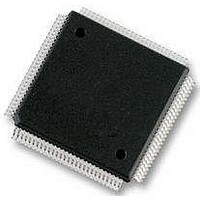MC912D60CCPVE Freescale Semiconductor, MC912D60CCPVE Datasheet - Page 152

MC912D60CCPVE
Manufacturer Part Number
MC912D60CCPVE
Description
IC MCU 16BIT 112-LQFP
Manufacturer
Freescale Semiconductor
Series
HC12r
Datasheet
1.MC912D60ACFUE8.pdf
(460 pages)
Specifications of MC912D60CCPVE
Core Processor
CPU12
Core Size
16-Bit
Speed
8MHz
Connectivity
CAN, MI Bus, SCI, SPI
Peripherals
POR, PWM, WDT
Number Of I /o
68
Program Memory Size
60KB (60K x 8)
Program Memory Type
FLASH
Eeprom Size
1K x 8
Ram Size
2K x 8
Voltage - Supply (vcc/vdd)
4.5 V ~ 5.5 V
Data Converters
A/D 16x8/10b
Oscillator Type
Internal
Operating Temperature
-40°C ~ 85°C
Package / Case
112-LQFP
Processor Series
HC912D
Core
HC12
Data Bus Width
16 bit
Data Ram Size
2 KB
Interface Type
CAN, SCI, SPI
Maximum Clock Frequency
8 MHz
Number Of Programmable I/os
86
Maximum Operating Temperature
+ 85 C
Mounting Style
SMD/SMT
3rd Party Development Tools
EWHCS12
Minimum Operating Temperature
- 40 C
On-chip Adc
10 bit, 8 Channel
Lead Free Status / RoHS Status
Lead free / RoHS Compliant
Available stocks
Company
Part Number
Manufacturer
Quantity
Price
Company:
Part Number:
MC912D60CCPVE
Manufacturer:
FREESCAL
Quantity:
203
Company:
Part Number:
MC912D60CCPVE
Manufacturer:
Freescale Semiconductor
Quantity:
10 000
- Current page: 152 of 460
- Download datasheet (5Mb)
Clock Functions
11.6.8 Pseudo-STOP
Technical Data
152
Each time the 13-stage counter reaches a count of 4096 XCLK cycles
(every 8192 cycles), a check of the clock monitor status is performed. If
the clock monitor indicates the presence of an external clock limp-home
mode is de-asserted, the LHOME flag is cleared and the limp-home
interrupt flag is set. Upon leaving limp-home mode, BCSP and MCS are
restored to their values before the loss of clock, and all clocks return to
their previous frequencies. If AUTO and BCSP were set before the clock
loss, the SYSCLK ramps-up and the PLL locks at the previously selected
frequency.
To prevent PLL operation when the external clock frequency comes
back, the software should clear the BCSP bit while running in limp-home
mode.
When using an external clock, i.e. a square wave source, it is possible
to exit STOP with the DLY bit cleared. In this case the LHOME flag is
never set and STOP is de-asserted without delay.
Pseudo-STOP is a low power mode similar to STOP where the external
oscillator is allowed to run (at reduced amplitude) whilst the rest of the
part is in STOP. This increases the current consumption over STOP
mode by the amount of current in the oscillator, but reduces wear and
mechanical stress on the crystal.
If the PSTP bit in the PLLCR register is set, the MCU goes into Pseudo-
STOP mode when a STOP instruction is executed.
Pseudo-STOP mode is exited the same as STOP with an external reset,
an external interrupt from IRQ or XIRQ, a Key Wake-Up interrupt from
port J or port H, or an MSCAN Wake-Up interrupt.
The effect of the DLY bit is the same as noted above in
Fast STOP
Recovery.
Clock Functions
MC68HC912D60A — Rev. 3.1
Freescale Semiconductor
STOP Exit and
Related parts for MC912D60CCPVE
Image
Part Number
Description
Manufacturer
Datasheet
Request
R
Part Number:
Description:
Manufacturer:
Freescale Semiconductor, Inc
Datasheet:
Part Number:
Description:
Manufacturer:
Freescale Semiconductor, Inc
Datasheet:
Part Number:
Description:
Manufacturer:
Freescale Semiconductor, Inc
Datasheet:
Part Number:
Description:
Manufacturer:
Freescale Semiconductor, Inc
Datasheet:
Part Number:
Description:
Manufacturer:
Freescale Semiconductor, Inc
Datasheet:
Part Number:
Description:
Manufacturer:
Freescale Semiconductor, Inc
Datasheet:
Part Number:
Description:
Manufacturer:
Freescale Semiconductor, Inc
Datasheet:
Part Number:
Description:
Manufacturer:
Freescale Semiconductor, Inc
Datasheet:
Part Number:
Description:
Manufacturer:
Freescale Semiconductor, Inc
Datasheet:
Part Number:
Description:
Manufacturer:
Freescale Semiconductor, Inc
Datasheet:
Part Number:
Description:
Manufacturer:
Freescale Semiconductor, Inc
Datasheet:
Part Number:
Description:
Manufacturer:
Freescale Semiconductor, Inc
Datasheet:
Part Number:
Description:
Manufacturer:
Freescale Semiconductor, Inc
Datasheet:
Part Number:
Description:
Manufacturer:
Freescale Semiconductor, Inc
Datasheet:
Part Number:
Description:
Manufacturer:
Freescale Semiconductor, Inc
Datasheet:











